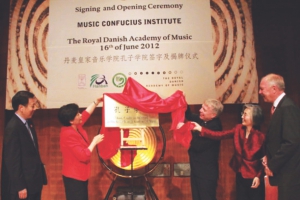| Home - Back Issues - The Team - Contact Us |
 |
| Volume 11 |Issue 49| December 14, 2012 | |
|
|
Impressions Culture, the Soft Power Shah Husain Imam
The one trend that has the potential to be a rage in international relations is the soft power of diplomacy and culture. In some specific ways, this promise of the soft tool exceeds even that of social media. Netizens may have had the feel of power through trans-border communication and free exchanges of views barring those in a few countries. Yet, a vast majority of people have no computers, and far less an access to internet. That's how it is perhaps going to be for a long time to come. What is more to the point, by comparison with the tools of soft power, is that there's a question-mark on the authenticity of entries into blog and Facebook. This explains why many people still rely on international electronic and online print media for authentic news and views. When the post-9/11 US had gone for hard options including invasions in its counter-terrorism campaign, a large segment of American thinkers advocated exercising soft power to connect with the people rather than inviting wrath from them. The soft power would be exercised through poverty alleviation, building hospitals, helping in child immunization and maternity care, undertaking various other welfare projects and promoting education and culture. But this was not to be on a desirable scale as it was overtaken by reconstruction contracts sharing scrambles in war-ravaged countries. The latest champion of soft diplomacy is Hilary Clinton, the US Secretary of State. She emphasises the softer side of diplomacy mixing social engagements into her itinerary. She worked on the agenda for women's empowerment, child welfare etcetera on her mission to Africa in particular. But the Danish and the Chinese have been focused on the 'flower power' of culture, graphically expressed in the words of Uffe Elbaek, the former culture minister of Denmark (recently replaced by Marianne Jelved). Said Elbaek in January this year on his trip to Beijing, "We are bringing our flowers to the table and China is bringing their flowers to the table, and out of that we can make a really interesting flower decoration together." There is much more to the inter-cultural interaction: It facilitates exchange of ideas in an animated fashion helping to learn from each other, more intensively than by any other method. This finds support in Nobel laureate Amartya Sen's observation that each country can learn from another, regardless of whether it is a developed or developing nation. Chinese-Danish 'year of culture' has been a testimony to Amartya's dictum. From the Chinese side Elbaek was keen to draw on 'a cultural mindset of a very old civilisation' vis-à-vis a young Danish civilisation. To Elbaek's worldview, creative industries including such core sectors as music, film, art and theatre also play a crucial role by inspiring the "hard" and traditional sectors. Now the in-thing in China and Denmark is the quest 'for use of culture, art and creativity as a way to move their companies and institutions up the value chain' (China Daily – European Weekly; January 20-26, 2012 issue). The food industry is one of the components of bridge-building at the people-to-people level with the whole range of other cultural assets that a country can share with another country. The depth and dimension of Bangladesh's cultural heritage are something to showcase as the connoisseurs delving into our culture discover not just as researchers but also from seeing the art, craft, theatre, classical music and dances being put on display at home, and occasionally, abroad. There should be more of these. With our strong folk traditions, we are a fabled country like Germany which prides itself on its cultural moorings. What we lack in economic clout can be more than made up by our cultural resources. It is the time to transform our culture into a creative industry which China and Denmark are rooting and shown the way for. The writer is Associate Editor, The Daily Star.
|
||||
Copyright
(R) thedailystar.net 2012 |
